Abnormal Vaginal Bleeding Post COVID mRNA “Vaccine.” A Review.
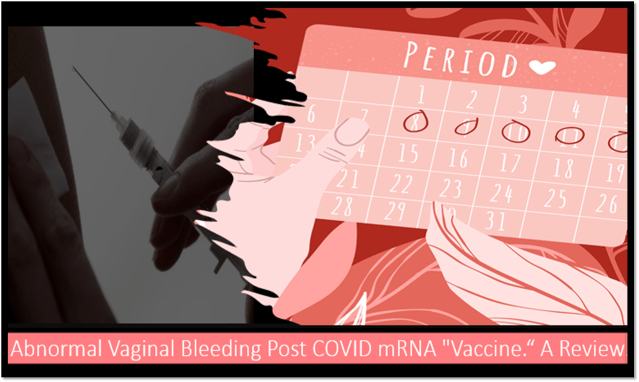
Vaginal bleeding after COVID mRNA “vaccination” is an issue that has not been well studied, says Dr William Makis, a Canadian physician who has expertise in Radiology, Oncology and Immunology. Dr Makis has recently reviewed VAERS reports and nine studies that actually do address the issue and although one paper in particular is making real waves, the real truth is far worse.
There are over 300,000 reports of abnormal vaginal bleeding or menstrual irregularities reported in WHO’s VigiAccess with heavy and prolonged bleeding being most common. However, non menstruating women have also reported abnormal vaginal bleeding after the COVID jab, and shockingly so too have children as young as 5 to 11 years old! Yet no one seems to be studying these cases.
Abnormal Vaginal Bleeding
WHO’s VigiAccess has over 300,000 reports of abnormal vaginal bleeding or menstrual irregularities reported for COVID-19 Vaccines, according to Dr Makis and surveys show that COVID vaccine causes menstrual irregularities in a large percentage of women, ranging from 30% (Danish), 39% (Norwegian), 44% (Saudi), to 49% (Israeli) of women.
The most common menstrual irregularities are heavy bleeding and prolonged bleeding, but also up to 14% of non-menstruating women have abnormal vaginal bleeding after the COVID jab (source).
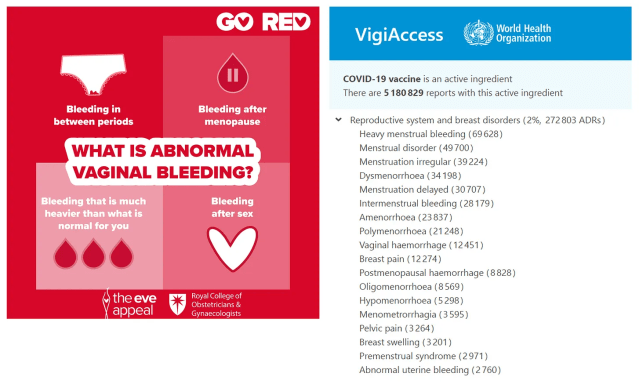
Studies Reviewed by Dr Makis
- Sep.22, 2023 – Blix et al. – Norwegian study of 20,000 women
- Sep. 2023 – Thabet et al. – Saudi Study of 500 women ages 18-45
- Sep.2023 – Jensen et al. – Danish study of 13,600 women ages 16-65
- Aug.2023 – Trogstad et al. – Norwegian study of 3972 women ages 18-30
- Jun.2023 – Paik et al. – South Korean study of abnormal uterine bleeding
- Jun.2023 – Yoon et al. – South Korean Survey of 2849 people ages 18-49
- Jun.2023 – Wali et al. – Saudi Study of 300 women ages 15-50
- Aug.2022 – Isaakov et al – Israeli study of 7476 vaccinated women
Study -Unexpected Vaginal Bleeding and COVID-19 vaccination in Non-Menstruating Women.
A Norwegian study Sep.22, 2023 by Blix et al. of women who self-reported experiencing unexpected vaginal bleeding after COVID-19 vaccination. Results are based on self-reported data from questionnaires issued in August and September 2021.
The Authors found:
- 7725 postmenopausal women (non-menstruating) – 3.3% had bleeding
- 7148 perimenopausal women (non-menstruating) – 14.1% had bleeding
- 7052 premenopausal women (non-menstruating) – 13.1% had bleeding
- 50% of these happened within 28 days of COVID-19 Vaccination
- Moderna had 32% increased risk compared to Pfizer
- In postmenopausal women, the risk of unexpected vaginal bleeding in the 4 weeks after COVID-19 vaccination was increased two- to threefold
- Risk of unexpected vaginal bleeding after vaccination was increased three- to fivefold in both non-menstruating peri- and premenopausal women
The European Medicines Agency (EMA) recently decided that the product information of the mRNA vaccines (i.e., Spikevax and Comirnaty) should be updated to include heavy menstrual bleeding as a potential side effect.
Postmenopausal bleeding following COVID-19 vaccination can be a symptom of endometrial carcinoma and precancerous lesions and is considered an important medical event (source).
Authors: “Increased risk after both Pfizer and Moderna suggest a mechanism related to the spike protein and not to other vaccine components. Pathways related to local changes in the endometrium, possibly resulting from a spike related immune response or related to the endometrial expression of ACE2 receptors may be involved”
Experts are not entirely sure why changes in menstruation occur, but some believe the vaccine causes some of the body’s tissue to become inflamed, causing changes to the lining of the uterus and hormone levels throughout the body.
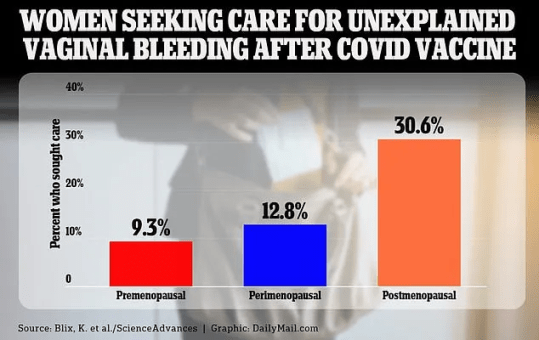
Study: Saudi Study of 500 women ages 18-45
Online self-administered survey conducted Sep. 2023 by Thabet et al.of 500 Saudi women ages 18-45.
- 44% reported menstrual disturbance
Found “a significant relationship between the duration of flow, menstrual blood loss, and severity of dysmenorrhea before and after receiving the first, second, and third doses of Covid-19 vaccine”
Study concluded that “women who receive the Covid-19 vaccine may experience menstrual abnormalities, such as a significant difference in cycle length, flow duration, menstrual blood loss, and dysmenorrhea severity before and after receiving the first, second, and third doses of the vaccine.”
Study: Danish study of 13,600 women ages 16-65
Danish study of 13,648 women ages 16-65 who completed surveys conducted Sep.2023 by Jensen et al.
- 30% of all menstruating women reported menstrual changes after COVID-19 vaccination
Study Found: “Several potential risk factors including stress, vaccine concerns, severe “COVID-19 infection”, and immediate vaccine symptoms were associated with these reports.”
Study: Norwegian study of women ages 18-30
Norwegian survey of 3972 women ages 18-30 years old conducted Aug.2023 by Trogstad et al. –
- 38.8% reported menstrual disturbance after 1st vaccine dose
- Heavy bleeding in 13.6% after 1st dose and 15.3% after 2nd dose
- Prolonged bleeding in 12.5% after 1st dose and 14.3% after 2nd dose
The Authors found: “increased risk of menstrual disturbances after vaccination, particularly for heavier bleeding than usual, prolonged bleeding, shorter interval between menstruations, and stronger period pain.”
Study: South Korean study of abnormal uterine bleeding
Study conducted Jun.2023 by Paik et al. Korean Specialized Committee for the compensation of loss after COVID-19 vaccination has decided to include abnormal uterine bleeding (AUB) as a “suspected related symptom” after COVID-19 vaccination on August 16, 2021, for all vaccine types, including those manufactured by Oxford-AstraZeneca, Moderna, Pfizer-BioNTech, and J&J.”
“This decision has enabled those who developed AUB after vaccination for COVID-19 to claim compensation from the committee and receive support.”
“The scientific basis for this decision was the analysis by the COVID-19 Vaccine Safety Committee of the National Academy of Medicine of Korea. After a comprehensive analysis of domestic and international data on adverse reactions reported after COVID-19 vaccination, the committee has announced the discovery of a statistically significant association between AUB and COVID-19 vaccination, which is sufficient evidence to establish a causal relationship.”
Study: South Korean Survey ages 18-49
South Korean researchers Yoon et al conducted a survey in Jun.2023 of 2849 people ages 18-49
- “A notable finding was that over 15% of female participants reported menstrual disorders and unexpected vaginal bleeding after mRNA vaccination”
Study: Saudi Study of 300 women ages 15-50
Saudi researchers Wali et al. studied 300 women ages 15-50 years old on Jun.2023
- 44% reported a change in the length and amount of the menstrual cycle
- 29% reported worsened premenstrual syndrome (PMS)
- 11% reported decreased libido
- 10% noticed a decrease in milk production
- 4% lost their pregnancy
Study: Israeli study of 7476 vaccinated women
Israeli researchers Isaakov et al conducted a nationwide questionnaire survey:Aug.2022 of 7904 women
- 49.3% of women had changes in menstrual patterns after COVID-19 vaccination
- 80.6% of them had “excessive bleeding”
- 61.1% of cases it occurred between vaccination and the ensuing menstrual period
Researchers Concluded: “long-term consequences of the BNT162b2 vaccine on uterine bleeding warrant further investigation.”
SERIOUS ADVERSE EVENT CASES OF VAGINAL BLEEDING:
VAERS ID 1904168 – 7 year old from Georgia had 1st Pfizer
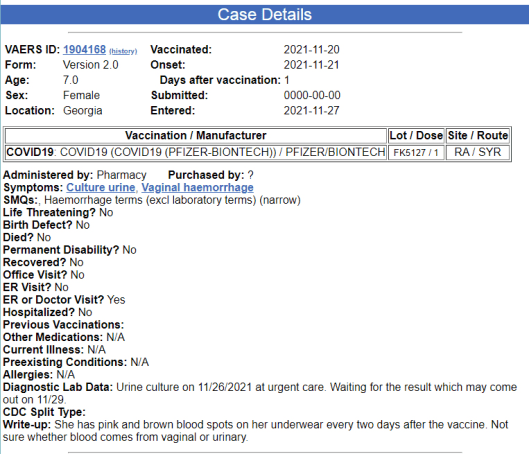
VAERS ID 2014388 – 8 year old from Illinois, had 1st Pfizer and had vaginal bleeding 9 days & 16 days later
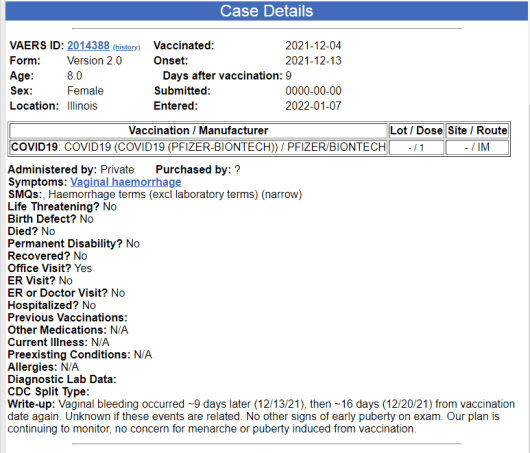
TGA 649566 (AUSTRALIA) – 6 year old had dysmenorrhea, heavy menstrual bleeding, menstrual disorder after Pfizer
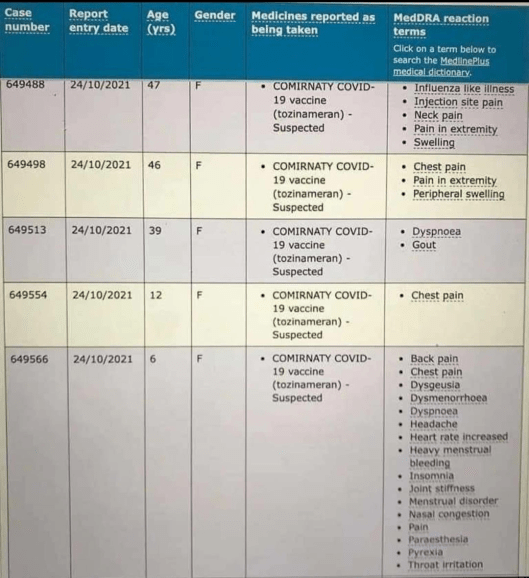
TGA 695126 (AUSTRALIA) – 11 year old had “vaginal hemorrhage” after Pfizer
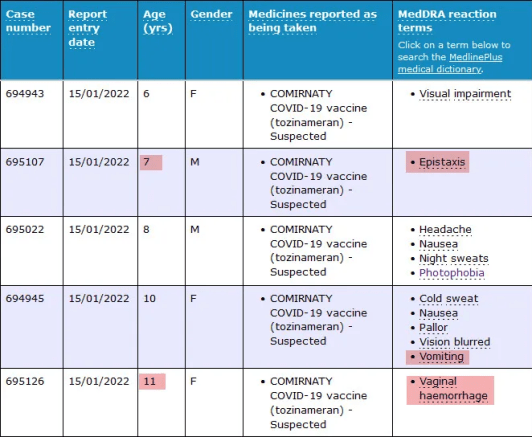
VAERS 1531771 – 30 year old from Colorado had 2nd Pfizer mRNA vaccine, then had vaginal bleeding, placenta abruption, infarction in placenta, preterm labor, hemorrhage during delivery. “Delivered my stillborn son”
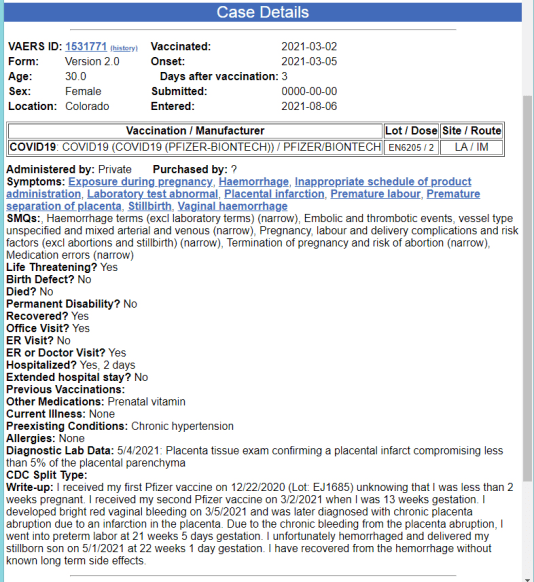
VAERS 1675804 – 33 year old from Minnesota had 1st Moderna mRNA – had vaginal bleeding, urgent C-section, premature separation of placenta, etc.
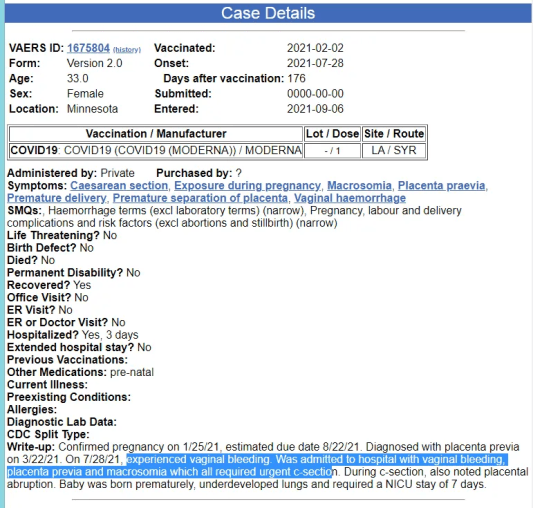
VAERS 1860486 – 29 year old from Illinois had 1st Pfizer mRNA at 15 weeks pregnancy – developed hemorrhage, fetal growth restriction, fetal disorders
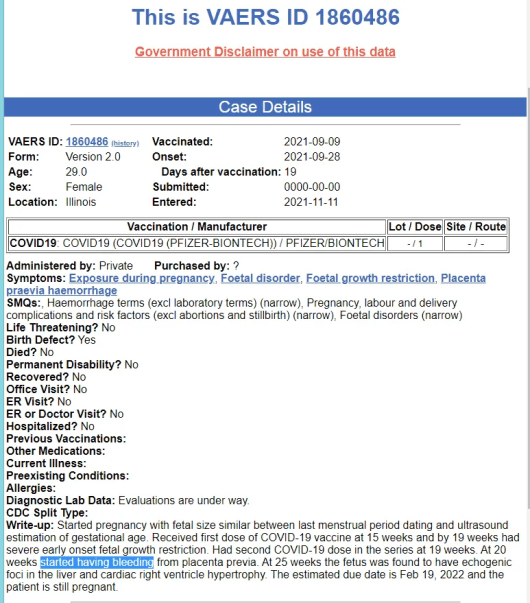
VAERS 2069904 – 33 year old had 3rd Pfizer mRNA Vaccine, then developed vaginal bleeding and miscarriage – this report was eventually erased/covered-up
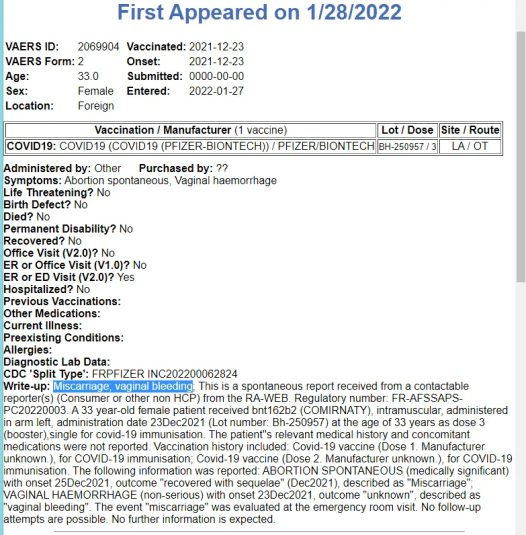
“My Take” by Dr. Makis.
WHO’s VigiAccess has over 300,000 reports of abnormal vaginal bleeding or menstrual irregularities reported for COVID-19 Vaccines.
Surveys show that COVID-19 vaccination causes menstrual irregularities in a large percentage of women, that ranges from 30% (Danish), 39% (Norwegian), 44% (Saudi), to 49% (Israeli) of women.
The most common menstrual irregularities are heavy bleeding and prolonged bleeding.
Up to 14% of non-menstruating women have abnormal vaginal bleeding after COVID-19 vaccination, in the latest Sep.2023 study by Blix et al.
No one is talking about post COVID-19 Vaccine abnormal vaginal bleeding in children ages 5 to 11 years old, despite the fact there are very disturbing reports in VAERS and TGA – no one is publishing these cases, no one is studying these cases.
No one knows the long term effects on fertility in children 5-11 years old, or 12-19 years old who suffer abnormal vaginal bleeding after COVID-19 vaccination
No one is studying the impact on fertility of reproductive age women who report menstrual irregularities after COVID-19 vaccination.
In the June 2023 Haerin Paik study “Female reproduction and abnormal uterine bleeding after COVID-19 vaccination” authors refer to these studies for the “safety” of COVID-19 vaccines on fertility:
- A Pfizer sponsored study of 44 rats showing “no fertility issues”, where the manuscript was reviewed by Pfizer and BioNTech Officials and the authors own Pfizer stocks (you can’t make this up).
- A study looking at 32 IVF patients in a single IVF Clinic
- Another study looking at 222 IVF patients with senior author sitting on the Boards of several Big Pharma companies.
- Another study looking at 441 IVF patients at a single IVF Clinic in Spain.
Authors Conclude: “COVID-19 vaccines certainly seem to affect the menstrual cycle; however, the effects are generally well-tolerated and transient. The most frequently reported problems are menstrual irregularities, followed by menorrhagia. However, the findings of recent studies are generally reassuring, as symptoms resolve within about 2 months.”
“It remains unclear whether certain groups are particularly vulnerable to menstruation-related adverse events following COVID-19 vaccination.” (no mention of the risks to children suffering these adverse events, or pregnant women)
“The natural pregnancy rates following vaccination also remain unclear.”
This is the elephant in the room that no one is addressing.
Up to 49% of women are suffering menstrual irregularities after COVID-19 vaccination – what are the long term effects on their fertility?
What are the long term risks to children who have abnormal vaginal bleeding after COVID-19 Vaccination?

This article has been archived for your research. The original version from The Exposé can be found here.



